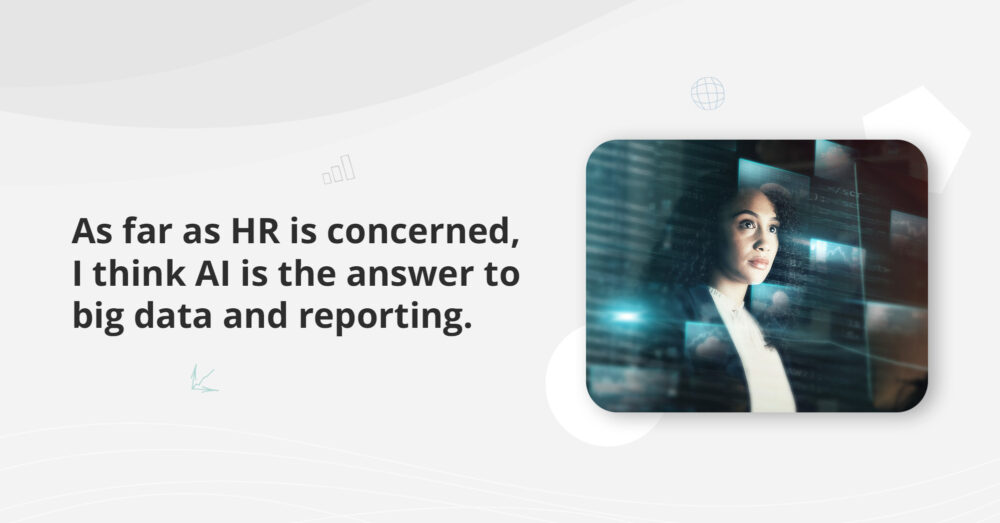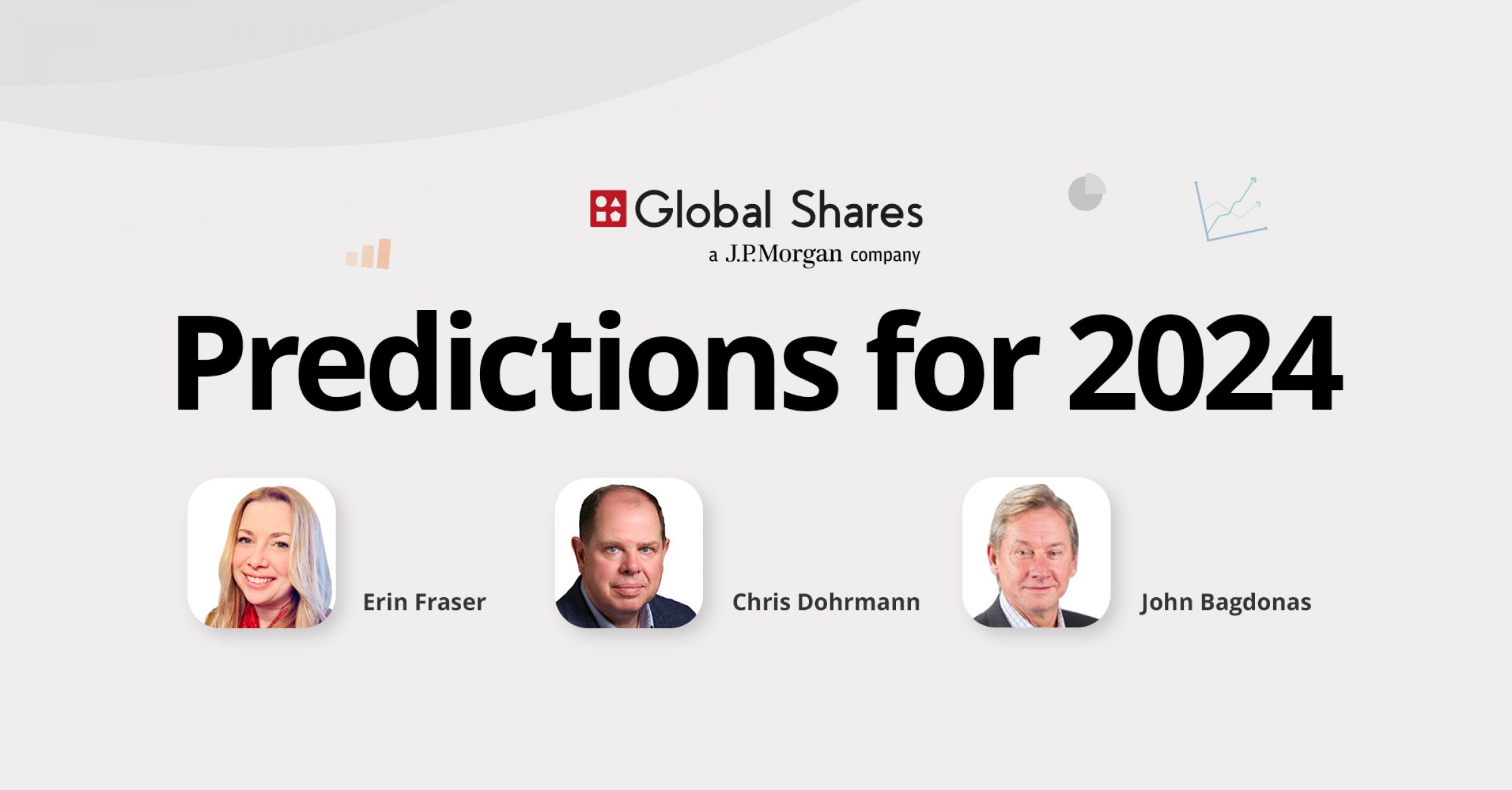The New Year presents the perfect opportunity to sit down and take stock. With that in mind guest host Erin Fraser VP Business Development for Global Shares, a J.P. Morgan company, joined our regular Own Up podcast team of Chris Dohrmann, SVP of Strategic Partnerships and John Bagdonas, SVP of Business Development, both with Global Shares, a J.P. Morgan company, to discuss their equity compensation predictions for the year ahead across a range of topics, trends and regulatory changes. You can read some of the highlights from their conversation below or listen to the full episode on demand here.
Mergers & acquisitions:
Chris Dohrmann
“I don’t think the drivers for M&A have gone away. (In 2019 and 2020) the focus both corporate and in our culture changed to be focused on the pandemic and getting through that. But I think there are companies out there that have excess cash, there are companies out there that are looking to be acquired, because that’s their liquidity event. They were having record years prior to the pandemic, so add in three years of inactivity, and waiting for whatever trigger, whether or not that’s the end of rising interest rates here in the US, or whether or not there’s any type of a scale back because inflation may be under control. I think all of a sudden, you’re going to see an increase in the level of mergers & acquisitions activity.”
“The Great Resignation” and Employee attrition rates and the impact on equity compensation:
John Bagdonas
“During the pandemic, there was a lot of people changing jobs. People realized they could work remotely, people realized that they didn’t necessarily have to stay in one place, there were so many opportunities, because once the economy started a comeback, after the initial consequences of the of the pandemic, people realized they could job hop pretty easily, particularly younger workers.”
John goes on to explain that the attrition rate peaked about Q1 2022 when it got up to about 3% of total Non-Farm Payroll employment. It’s slowed down now by 25% to 2.25%, which he states has resulted in companies like Bank of America, Morgan Stanley and Wells Fargo having to reduce head count as they had anticipated that the higher attrition rates would have continued for longer.
“For Equity compensation, it’s not as necessary for retention purposes because not as many people are leaving, so there are fewer promotion opportunities for higher performing employees because not as many positions are opening through attrition or the normal process. I think equity rewards are going to become more skewed towards those high level performers as compared to retention, because when people were just leaving, equity awards were used for retention purposes. With this reduction in attrition rates, I think what we’re going to see is a move more towards what used to happen, that equity is targeted to incentivize and reward high performers more than a short-term retention tool across the board.”
Chris Dohrmann
“I agree and think it ties back to M&A as well. These are two factors, where you can see things happening when people are considering changing the vesting schedules. So I think during the great resignation folks were considering going from four and five years vesting down to three. I think we’ve already started to see people move back to a four year vesting, because the competition for labor, I won’t say it’s shifted back in favor of the employer, but I think it’s more to the middle.”
Chris goes on to speak about how he doesn’t think adjusting vesting schedules on a large scale in a very short period of time is the best practice, but rather favours where there are positive cultural changes made in companies, while Erin concludes that “no-one wants to say recession, and maybe recession won’t happen but definitely, with companies tightening the reins of their finances we’re seeing that strain on the employee base and the need to manage layoffs.”
The affect of AI on HR and total rewards?
Chris Dohrmann
“As far as HR is concerned, I think AI is the answer to big data and reporting. AI allows a company to peruse large amounts of data, from sources that may already be available to them, whether they be resumes, exit interviews, or management reviews that are done on a quarterly or an annual basis. This could be used to identify people that may be looking to change jobs, and identify people that may be at risk, and should be, you know, cultivated or discussed away from a job change before they elect to just abandon the company. So it can prompt reviews earlier, or at least (allow for) conversations (to be had) earlier than we normally would have. So I think AI is going to be the way we can actually get to use big data because it’ll give us a tool that allows something to be done much quicker than people could do it on their own.”
John Bagdonas
“It’s going to be very interesting to see how companies adapt, because AI and how people are using AI or how people predict… it’s going to be interesting how we adapt, and how we continue to evolve, whether it’s within the business world or all aspects of life. I think it touches so many different topics and I think probably some of the additional things we’re going to talk about as well are going to have a strong AI flavor.”

Cybersecurity:
John Bagdonas
“I saw a stat not that long ago, I believe it’s from Forbes, that by the end of this year, the cost of cyber-attacks on the global economy is predicted to top 10 and a half trillion dollars. I mean, that’s a lot of money. How many assets and strategies and so many other things are deployed on both sides of the equation, because interestingly from a cybersecurity standpoint, you’ve got the attack side, and you’ve got the defense side. AI is really going to have a transformative impact on both sides of that equation.”
John then talks about his predictions around more sophisticated malware that can adapt and intelligently evade detection and continue to evolve, while using the analogy that the cybersecurity battle is like a game of chess with AI being the Queen, as the most powerful piece on the chessboard for both sides.
“Another stat I saw recently was that by 2026 70% of all boardrooms are likely to have at least one member of the board with expertise in the (cybersecurity) field. Aside from a cybersecurity standpoint, it really becomes one of the highest priorities in terms of protecting the assets of all of our clients and customers and so it’s extremely important.”
John rounds this out by speaking about potential gaps in an OSI cybersecurity standpoint is through the Internet of Things (IoT) where refrigerators and all of our appliances and vehicles are connected to the internet and how it will be interesting to see how bad actors may begin to direct attacks this way rather than the traditional informational avenues. He concluded with some thoughts about how this may factor into the elections in the US, India and the UK later this year. John notes that there have been assertions of possible election interference over the last few cycles, but it will be important to consider what would be the potential impact of attempted cyber-attacks (particularly State-Sponsored) on the election infrastructure and information available to people?
Chris Dohrmann
“On the positive side, Microsoft, Amazon, and others, I think some of their most profitable business lines are now cloud computing. That didn’t exist three, four years ago. For that to be so profitable for those companies in such a short period of time, I think is amazing. So follow the money. (John) talked about the fact that cyber threats and cybersecurity will potentially cost the US economy $10 trillion.”
“I’ve already seen Microsoft make very auspicious comments in the press, about the fact that they’re going to police use of their software when it’s done for nefarious means. The fact that cyber protection, whether it be multi factor authentication, biometrics, whatever it may it need be to protect all of us, from somebody attacking our wealth and, and our finances, I think that’s going to be a very profitable area for the company that comes out and says, ‘We can be the proactive defender for your wealth and data.”
Pay Transparency:
Erin Fraser:
“Going more back into the equity comp world and talking pay transparency, there’s been a lot of conversation around this of late, and I’d love to hear your feedback on it.”
Chris Dohrmann
“In the US there are probably more than 25 or 30 jurisdictions that now have some type of call for pay transparency and I think it originally started with salary. So whether or not you’re posting a job, or whether or not you’re recruiting for a job, there was a requirement that that salary had to be made available. Now, this brings in a number of other different factors, whether they be generational or not. For example as a boomer, I would be reluctant to share my salary with anyone, whereas Gen X, Y, and Z tend to be very open about their pay. But having it mandated by a jurisdiction or a regulatory body is something different.”
“New York City has already started to saying transparency really applies to total compensation, not to just salary. So whereas maybe you could put out a range and say, ‘Look, we’re gonna start with the low end to the midpoint’, as I think a lot of companies have done to try and address the pay transparency requirements, New York City’s throwing in a complicating factor by saying it’s total compensation.”
“I don’t know if you can do the same range in a real fashion, when you’re talking about equity, because I think it’s going to be performance equity, and it could be a lot more different. That range is not going to be so easy to calculate. The other complicating factor that New York City is throwing in is if you have remote workers, and people are going to have that now, whether it’s hybrid are fully remote from now, if they report to a New York HQ, then you’re subject to the New York City regulatory requirement. So in short, I think pay transparency is already started. It’s already out there. It’s going from salary rate to total compensation and it’s also going to address where, much like taxation, where the individuals report to, not where they’re working from.”
Pay Transparency, Pay Equity and Pay versus Performance:
John Bagdonas
“I think companies have made a very good effort in terms of collecting that data, disclosing that data, particularly from a pay equity standpoint, there are a lot of companies including our own parent company (J.P. Morgan) that have made leaps and bounds in terms of being able to document that and display it and report it and make strides towards the end goal of achieving equity so that no discrepancies exist between different groups of employees. Equity compensation is, I think, going to continue to complicate the picture and particularly how equity comp is used at different levels in organizations that it’s going to still require quite a bit of work to build into that total compensation picture.”
“About pay versus performance, it’s interesting how, over the last year and a half or so, our companies have gone through this requirement and last year, 2023 was the first year that the disclosures were required. We saw tangentially with many of our clients that they had to create multidisciplinary teams, including HR legal and many times their outside advisors had to calculate the compensation actually paid and put it in the appropriate formats and discussions within their proxy disclosures, etc.”
“Particularly from an equity standpoint some of the rules were pretty complex on how they were valued and also they had to do remeasurements, depending on the plan type and the award types, etc. It’s still very early on in the process but I think the early feedback from last year is that the compensation actually paid, is a helpful insight, but it wasn’t as reliable necessarily, as some of the other historic measures. It’ll be interesting for this year to see how institutional investors in particular and proxy advisors build in requirements or comments on how they will apply on various disclosures during this upcoming proxy season.”
Chris Dohrmann
“Institutional investors are not usually reacting to new regulations. In the first or second year they wait a bit to find out how it’s being implemented, how it’s being adopted, and whether or not there’s any corporate pushback on the regulatory bodies… I think the proxy advisors react after the fact. So I think they’re slow, two years being the definition of slow here. I think they will react, I think they will have an opinion, I think they will recognize the fact that pay equity and pay transparency is probably good corporate governance but I don’t think it’s going to come in 2024.”
T+1 Settlements:
John Bagdonas
“There’s a couple of compliance or regulatory issues that we’re going to see over the course of this year, probably the one that’s closest right now is the transition to T+1 which is scheduled to happen as of May 28th. There’s definitely an impact there from an equity plan standpoint, the settlement is going to go down to the next day on any market transactions basically. I think the biggest consequence or preparatory thing is to make sure that the records are in good shape because you’re going to transactionally lose a day to recoup or correct any transaction.”
Corporate Transparency Act:
John Bagdonas
“The Corporate Transparency Act (CTA), which is going to become effective in January next year 2025, where there’s going to be a new beneficial ownership reporting requirement that’s basically through FinCEN, or through the Department of Treasury where they want to track entity structures and ownership for AML (anti-money laundering) and KYC (know your client) purposes, and will affect predominantly non-reporting companies, in other words, non-publicly traded companies. Interestingly enough for publicly traded companies, if their subsidiaries have certain ownership structures, they may be subject to reporting requirements as well. The CTA carries criminal penalties for non-compliance. It’s something that’s going to be very important in for all companies that existed before 2024. The deadline is early January to be in compliance, so something to keep aware of as well.”
Volatility:
Chris Dohrmann
“Geopolitics really has an impact on the economy, and on equity specifically. Politics usually ends up talking about money, and about taxation, and taxation is something that’s going to really trigger whether or not equity is something that people can receive and profit from. Politics and the associated debate, may also trigger volatility.”
“I think we’ve learned from the pandemic – learned multiple lessons but I think a major one has been to recognize the return of volatility. Market volatility is something people hadn’t seen for the better part of 15 years and I think now it’s here to stay. At the very least, volatility in the markets is something that’s probably not going to go away anytime soon.”
Want more?
Listen to the full episode here.
By visiting a third-party site, you may be entering an unsecured website that may have a different privacy policy and security practices from J.P. Morgan standards. J.P. Morgan is not responsible for, and does not control, endorse or guarantee, any aspect of any linked third-party site. J.P. Morgan accepts no direct or consequential losses arising from the use of such sites.
Please Note: This publication contains general information only and J.P. Morgan Workplace Solutions is not, through this article, issuing any advice, be it legal, financial, tax-related, business-related, professional or other. J.P. Morgan Workplace Solutions’ Insights is not a substitute for professional advice and should not be used as such. J.P. Morgan Workplace Solutions does not assume any liability for reliance on the information provided herein.



